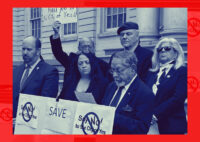A group of conservative City Council members is making a last-ditch effort to stop ballot measures that could overhaul how certain housing projects are approved in the city.
Members of the Council’s Common Sense Caucus filed a lawsuit asking a state Supreme Court to void three questions that will be posed to voters in November.
The questions, if approved, would weaken the City Council’s sway over certain housing and infrastructure projects, in an effort to speed up construction and sidestep members who are notoriously against new housing in their districts.
The lawsuit claims three of the five ballot measures violate city and state environmental laws by “failing to incorporate environmental concerns and considerations into the ballot proposals.”
“Petitioners are not opposed to increased housing – particularly affordable housing – or in solving the housing crisis,” the lawsuit states. “Petitioners are opposed, however, to covering up and concealing the environmental consequences of the ballot proposals.”
The lawsuit — filed against Mayor Eric Adams, his Charter Revision Commission and the Board of Elections — alleges that the questions should be annulled until the environmental consequences of the measures are assessed. Plaintiffs include Council members Joann Ariola, David Carr and Robert Holden, along with other Republican lawmakers, including Rep. Nicole Malliotakis, community groups and Council member Darlene Mealy, a Brooklyn Democrat.
The Board of Elections certified and printed the ballots this month, meaning that it is too late for the questions to be removed.
Council members have not been shy about their opposition to the ballot measures, which threaten a fundamental power members have held since the 1980s.
The City Council effectively has the final say over land use actions through the city’s Uniform Land Use Review Procedure, or Ulurp. Members tend to vote according to the wishes of the local member, in a tradition called member deference (though the Council defied the practice last week with two small housing projects).
One of the ballot questions targeted by the lawsuit asks whether the city should replace the rarely-used mayoral veto in Ulurp with a three-member appeals board for certain housing projects. The board would be able to reverse Council decisions on projects that would result in affordable housing in one borough.
Another question asks voters if modest housing and infrastructure projects should go through a quicker review process, dubbed Expedited Land Use Review Procedure, or Elurp, that skips City Council or City Planning approval, depending on the project type.
The third proposal would fast-track housing (avoiding a Council vote) in the 12 districts that have approved the lowest rates of affordable housing over a five-year period.
The other two questions on the ballot, which have gone unchallenged, ask if local elections should be moved to even years, coinciding with presidential elections, and if the official street map of the city should be digitized and consolidated.
The questions are the same three that City Council leaders have called misleading. Speaker Adrienne Adams has said the proposals threaten to consolidate power in City Hall, while stripping Council members of leverage to secure deeper housing affordability and other benefits when negotiating with developers.
The Council tried to convince the city Board of Elections to remove the questions before ballots were printed.
That effort failed, and Speaker Adams said she wouldn’t file a lawsuit, opting for a public campaign against the measures instead.
A spokesperson for Council leadership indicated on Tuesday that the Speaker and broader Council are not involved with the Common Sense Caucus’ lawsuit. A representative for the Common Sense Caucus said that attorneys working on the case have filed the lawsuit pro bono.
The complaint shares plaintiffs and some arguments with another lawsuit filed in March, which alleged that the City of Yes for Housing Opportunity should be annulled. The complaint, also led by members of the Common Sense Caucus, claimed that the Adams administration violated city and state environmental laws by failing to do a comprehensive review of the impact of the zoning changes.
The Black Institute, Queens Civic Congress, Midtown South Community Council and Park West Village Tenants’ Association are listed as plaintiffs in both cases. Attorney Jack Lester is also working on the two lawsuits.
The City Council recently launched a website urging New Yorkers to vote against the three questions. Proponents of the questions, including pro-housing group Open New York, announced this month that they would spend $3 million to promote the ballot measures.
“The GOP doesn’t want affordable housing on the ballot because they know the truth: these measures are widely popular, will pass overwhelmingly, and help keep New York the most diverse and dynamic city in the world,” Amit Singh, director of the YES on Affordable Housing campaign, said in a statement. “If you don’t like it here, I’ve got a house to sell you in Nassau County.”
Read more

City Council hints at lawsuit over land use ballot questions

Opponents sue to annul City of Yes

Fast-tracking NYC housing, weakening City Council’s zoning power will be on the ballot this year


